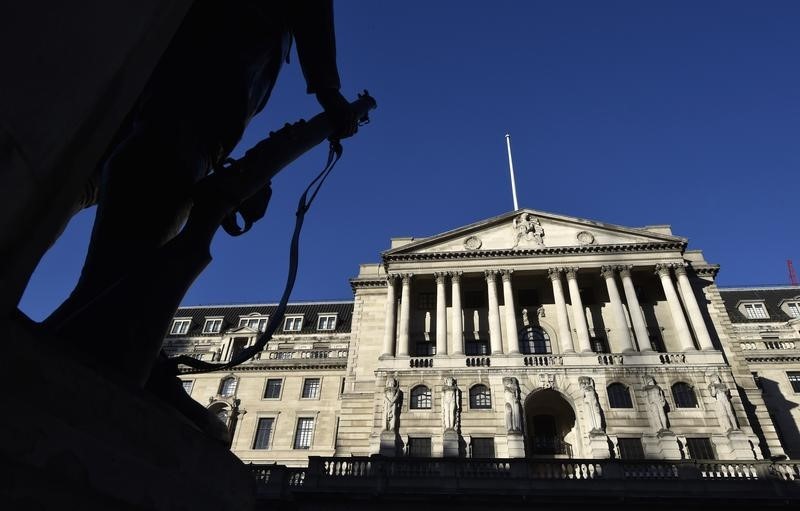By David Milliken and Li-mei Hoang
LONDON (Reuters) - Two Bank of England policymakers have ditched their long-standing calls for an end to record-low interest rates in the face of tumbling inflation, prompting economists to again push back forecasts of when the BoE will start to tighten policy.
A slump in oil prices caused British inflation to drop far more than expected to a 14-year low of 0.5 percent in December, far below the BoE's 2 percent target and a level that brings outright falls in prices into prospect.
Minutes of the Jan. 7-8 Monetary Policy Committee meeting published on Wednesday showed unanimity for the first time since July, after Martin Weale and Ian McCafferty said raising rates now might cause below-target inflation to become entrenched.
British government bond prices jumped and sterling fell towards an 18-month low against the dollar on the news, which had been forecast by just one of 24 economists polled by Reuters.
The change of heart by Weale and McCafferty came even as labour market data showed the unemployment rate falling to its lowest in more than six years at 5.8 percent and wages outstripping inflation for a third month.
Britain's central bank faces a dilemma over how far it should look beyond falls in inflation driven by lower oil prices -- which it expects to be temporary -- and instead focuses on longer-term drivers of price rises such as higher wages.
The unexpected move by the BoE prompted economists at Deutsche Bank and Nomura to push back to early 2016 their forecasts of when interest rates would rise, and contributed to a sharp fall in 10-year gilts' yield premium over German debt.
"With the Bank not willing to look through the weakening in headline inflation and with further falls likely ... we have moved our view out for the first hike in interest rates substantially, to May next year," said Deutsche Bank's chief UK economist George Buckley.
Before the release of the minutes, financial markets had been pricing in a first move by the BoE in early 2016, and just a few months ago a rate rise in early 2015 was thought likely.
The BoE said there was a "roughly even" chance that inflation would go below zero in the first half of 2015, though strong domestic demand reflected in Wednesday's labour market data helps explain why the BoE thinks this dip will prove brief.
Weale and McCafferty said their decision to stop voting for an increase in rates was "finely balanced", but they did not want to take any chances.
"They noted the risk that low inflation might persist for longer than the temporary factors implied and concluded that this risk would be increased by an increase in Bank Rate at the current juncture," the minutes said.
In the medium term, BoE policymakers saw potential upward pressures on prices from signs of a pick-up in wages and falling mortgage interest rates, both of which would increase households' disposable income.
"It was possible that the risks to CPI inflation in the medium term might have, if anything, shifted to the upside, but all members were also alert to the downside risk of current low inflation becoming entrenched," the minutes said.
Nomura economist Philip Rush said the BoE had overestimated the deflation risks and now risked raising rates too late.

"By setting policy to mitigate a very low probability tail risk, the ... outlook for policy becomes inappropriate," he said. "If policy is too loose for too long, inflation is the consequence."